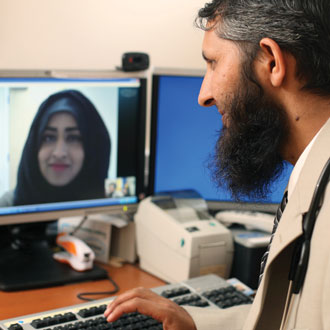Online GP consultations don’t save time or money, finds study

Online consultation systems are not likely to have any notable impact on patient waiting times and could even add to practice workload, according to new research.
The research looked at the impact of online consultations in primary care, reviewing a pilot study between April 2015 and June 2016 involving 36 practices using the eConsult (formerly WebGP) platform, which enables patients to self-manage and consult online with their own GP through their practice website.
One of the key findings of the research, published by the Society for Academic Primary Care (SAPC), was that 38% of e-consultations then resulted in a face-to-face consultation and a further 32% in a telephone call from a clinician.
GP practices will be be incentivised to offer ‘online consultations’ to patients through a £45m funding pot as part of a new injection of IT funding announced in NHS England’s General Practice Forward View.
The most common reason for an e-consultation was for administrative reasons (for example, requesting fit notes, repeat prescriptions) followed by infections, immunological issues and musculoskeletal issues.
The researchers said: ‘Unless usage of online platforms increases and integration with IT systems improves, online consultation systems are not likely to have any notable impact on patient waiting times and staff workload and may add to practice workload.
‘While our results indicate that there is an appetite amongst patients and practices to engage with digital communication, the study also highlights the challenges of remote consultations which lack the facility for real time interactions.’
BMA GP Committee chair Dr Richard Vautrey said: ‘The risk is that online consultations simply add another lane to the motorway leading to the GP practice and don’t replace or reduce the number of consultations. Any electronic communication needs to be handled wisely and with care.’
He added: ‘They can be good for things like repeat prescriptions but they cannot replace face-to-face consultations for complex issues. In a face-to-face situation GPs can pick up visual clues and can get to the bottom of things when a patient presents with one thing but that is not the real health issue.’
Family Doctor Association chair Dr Peter Swinyard said: ‘I am gently cynical about it. It’s hard to do consultations on a computer. Judging from this study, most GPs (70%) ended up having to do two consultations (face-to-face or telephone) as a result.’
Dr Swinyard said that electronic consultations have their place, for repeat prescriptions for example, but ‘if someone says they have a pain in their tummy then I would rather see them’.
Dr Swinyard added: ‘GPs use all their senses, they can “smell illness”, the way someone walks in, the way they act on the telephone, these are all non-verbal clues.
‘This is the sort of trendy thing that a Government bereft of ideas would come up with – instant access to a doctor.’
Birmingham-based GP ‘superpractice’ Modality has moved to having 80% of their patient contact via telephone or online.
A spokesperson told Pulse: ‘From our perspective, it is essential to establish robust IT systems and architecture to make online services comprehensive and integrated.
‘The experience that Modality Partnership has of using digital solutions has been positive and we continue to seek innovative ways to support our patients to access primary care services.’
The spokesperson pointed out that a cohort of Modality’s Hull practices are piloting the e-consult system.
‘This only began a couple of months ago so it is too soon to be able to comment on the overall impact, and whilst patients have been using it, we have noticed that largely the queries have been admin-related rather than clinical requests,’ added the spokesperson.
‘We will continue to evaluate the impact and assess if such a system is to be deployed across all of our sites.’
A report from the Nuffield Trust health think-tank last year warned that online services and apps were no ‘magic bullet’.
And in May last year a survey found that very few GPs are offering email or Skype-style consultations and most have no plans to introduce them in the future.
The survey asked more than 400 GP practices about alternatives to face-to-face consultations. Only 6% said they used email consultations regularly – and none at the time offered internet-based video consultations on programmes like Skype or FaceTime.
The online consultation research was presented to the SAPC annual scientific meeting in Warwick this month. It was funded by the One Care Consortium and the National Institute for Health Research Collaboration for Leadership in Applied Health Research and Care West (NIHR CLAHRC West) at University Hospitals Bristol NHS Foundation Trust.
An NHS England spokesperson said: ‘A number of practices are already running online consultations and have found them to offer both patients and GPs a quicker, more convenient option than face-to-face appointments.
‘This is why we have committed £45m over the next three years to give every practice across the country the chance to offer online consultations and we will be announcing more details shortly.’
Pulse October survey
Take our July 2025 survey to potentially win £1.000 worth of tokens











